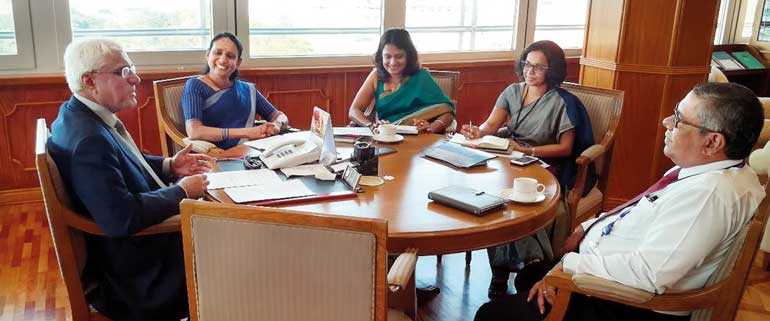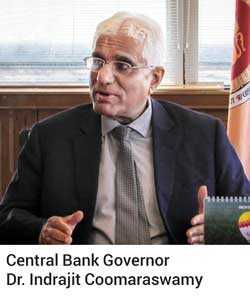Friday Feb 27, 2026
Friday Feb 27, 2026
Thursday, 11 July 2019 00:00 - - {{hitsCtrl.values.hits}}

CB Governor with KPMG team
“The banking sector is the lifeblood of the economy,”statedCentral Bank of Sri Lanka (CBSL) Governor Dr. Indrajit Coomaraswamy in conversation with the KPMG team for the firm’s latest Banking Sector Report.
He elaborated that the outlook of the banking sector is reliant on the overall health of the economy. At present, Sri Lanka has an output gap and the CBSL is focusing on improving the growth rate as macro-economic stabilisation has become crucial, while keeping revenue enhancement based fiscal consolidation at the heart of it. 
Sri Lanka is prone to external economic shocks as imports remain approximately twice our exports which needs to be addressed immediately. There are several key initiatives taken to improve this and the country is beginning to see the improving trend: Sri Lanka has had a surplus in the budget only three years since 1955 with two of those years happening to be 2017 and 2018. Dr. Coomaraswamy raised concerns of any undoing of the good work due to political scenarios leading up to the election.
Our revenue is approximately 14% of GDP which needs to ideally improve to 16-16.5% of the GDP to remain sustainable in the light of our expenditure running at the rate of 20% of GDP. He reiterated that the level of budget deficit that can be financed on a sustainable basis without worsening our debt dynamics is in the range of 3-3.5%.
Several key initiatives need to be implemented to improve exports. Investment promotion, BOI being more focused, trade policies and agreements, trade facilitation, the Customs electronic window to bring down transaction costs, facilitating easy cross border movements are some of these. A move in the right direction would improve the economy and as a result improve the banking sector.
Sri Lanka is a twin deficit country and although we have begun to make certain progress, it is very slow and could easily be derailed by the volatile political goalposts in the country. If the economy continues on this favourable path, we can reach 6% growth in the next 5-6 years which would clearly improve the outlook of the banking sector.
Reflecting on initiatives which need to be focused by the banking sector Dr. Coomaraswamy stressed on the importance of shifting away from the preoccupation with collateral based lending to building capacity to facilitate lending against cash flows. He mentioned that although it is nearly a decade since the end of the civil war, the banks as well as the overall private sector have not fully realigned their risk appetite with the business models based on emerging trends.
Presently, most of the investments are made on low risk short term industries/projects and he commented on the need to recalibrate the risk appetite to be able to invest on long-term industries with a long payback period such as manufacturing and construction. This would aid in the overall improvement of the exports of the country.
When posed with the question of accountability of SMEs, which is a considerable portion of a bank’s lending portfolio, Dr. Coomaraswamy stated that the responsibility of enhancing corporate governance and accountability of SMEs lay equally with the Government and the banks.
Another topic of the discussion was the importance of technology in the banking industry with the emerging global trends. As bricks and mortar based branch banking systems are becoming obsolete globally, CBSL has the daunting task of supporting the banks with the process of smooth transition from branch banking to technology driven channel/digital banking without causing instability to the network.
Cybersecurity poses a larger issue as well in this light with emergence of new digital based products to cater to the evolving customer requirements. Further, the Financial Intelligence Unit would increase focus on Anti Money Laundering and terrorism financing. The Central Bank of Sri Lanka is in the process of formulating a consultation paper on technological risk resilience and roadmap to guide the market on this path.
He mentioned that The Payment and Settlement Department has a regulatory sandbox to test the viability of new technology such as digital wallets and other methods of electronic payments. These are some of the outcomes of two committees set up by CBSL to look into fintech and blockchain technology.
When discussing fraud risk management and sanctions based inspections carried out in many developed countries, Dr. Coomaraswamy indicated that the current Banking Act gives only limited authority for the regulator to take punitive action against wrongdoers. He stated that the Banking Act is being reviewed at present with the intention of strengthening the position of the regulator and to penalise recalcitrant financial institutions and senior officers with monetary sanctions.
Next the KPMG team inquired on the exchange rate and his outlook as the Governor of CBSL. Dr. Coomaraswamy explained that the inflation differential between us and our trading partners if kept down lessens the pressure on the exchange rate. Further he stated that containing the Current Account is crucial.
He mentioned that the Current Account deficit which can be financed without debt dynamics being challenged is approximately 2% and if this is achieved the currency can be depreciated at the ideal rate of 2-3% per annum and stay competitive. In 2018 the Current Account deficit went up to 3.2% due to endogenous as well as exogenous factors but the CBSL anticipates that this year this would be brought down to a manageable and healthier 2.3%.
In closing the Governor mentioned about the critical role played by professional service providers, especially the auditors as well as regulators and emphasised on the formidable responsibility of oversight both have while maintaining professional independence in a turbulent market which is fairly small and relationships are intertwined in a myriad ways.